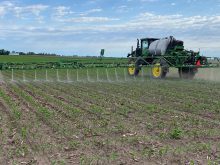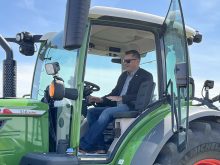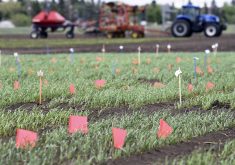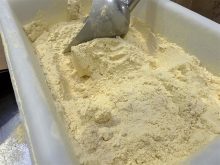Organic researchers met in Winnipeg in late February to share results at the first Organic Science Cluster Conference.
Organic research has been augmented under a science cluster funding arrangement from Agriculture Canada through the Organic Federation of Canada to the Organic Agriculture Centre of Canada (OACC).
This funding arrangement began in September 2010 and will run until March 2013.
The OACC worked with at least 80 researchers in 45 research institutions to deliver on 30 research projects.
The presenters included researchers working on science cluster projects as well as international experts invited to share in the exchange. Here are the highlights:
Read Also

Farming Smarter receives financial boost from Alberta government for potato research
Farming Smarter near Lethbridge got a boost to its research equipment, thanks to the Alberta government’s increase in funding for research associations.
Ralph Martin from the University of Guelph said organic agriculture has been recognized as a sustainable science-based agricultural system in the last decade.
“We can claim science and we are,” he said.
Gunta Vitins, who runs Vitins Consulting in Vancouver and has worked in Canada’s organic sector for years, described the Canadian organic sector as one of the world’s top 10 organic markets with a history of tremendous growth.
However, she expressed concern about its continuing health in the face of declining producer numbers, competing “natural” claims and non-regulated intra-provincial trade.
She urged the organic sector to do more “to support new entrants, encourage producers to maintain certification, provide knowledge transfer and encourage conversion.”
Derek Lynch, Canada Research Chair in Organic Agriculture at the Nova Scotia Agricultural College, said agriculture uses 50 percent of the world’s land base.
Organic agriculture offers multifaceted benefits such as a lower environmental footprint, better energy efficiency and more biological activity in the soil.
The question for the future is whether we can partner with consumers, find innovative approaches and transform agriculture to benefit society.
Sarah Braman of the University of Manitoba compared organic and conventional plots with a restored native prairie. She found that organic and native prairie areas returned to normal more quickly after flooding and showed more resiliency than conventional plots.
Celine Boutin from Environment Canada argued that maintaining biodiversity within agricultural areas should be a primary goal for farmers.
Organic farming is linked to greater biodiversity, both in fields and in the hedgerows and shelterbelts beside the fields. She found more plant and bird species and organisms in general in organically managed fields and hedgerows than in those managed conventionally.
“Organic farming favours biodiversity,” she said.
Kathleen Delate of Iowa State University found no significant differences between organic yields and average Iowa county yields, but did find economic and environmental benefits.
Organic fields had lower overall cost of production and higher net returns. Organic also had better overall soil quality, better nitrogen mineralization potential, higher levels of soil organic carbon, better carbon sequestration and reduced greenhouse gas production than conventional agriculture.
Mohammed Khakbazan of Agriculture Canada asked why consumer demand has not prompted more farmers to adopt organic practices.
In a study in Prince Edward Island, he found that organic potato production had higher net revenues and was more profitable than conventional production, but was still considered high risk by conventional producers.
Harun Cicek of the University of Manitoba talked about farmers’ lack of income during green manure crops and the potential for grazed green manures.
He compared sheep grazing to tillage incorporation as ways of terminating a variety of green manure crops.
“Grazing green manures increased nitrogen availability to following crops, sometimes causing yield increases,” he said.
“As such, grazing by sheep has the potential to augment the value of green manures.”
Frank Kutka of North Dakota State University reviewed the development of extension services for farmers and how they have always been seen as essential in the United States. Web based platforms are now being used to allow constant access to information, from online print resources to YouTube and Twitter.
The diversity of organic research is deeply satisfying. Organic has become a valid research topic. Researchers are carving out projects that express a wide range of interest.

















